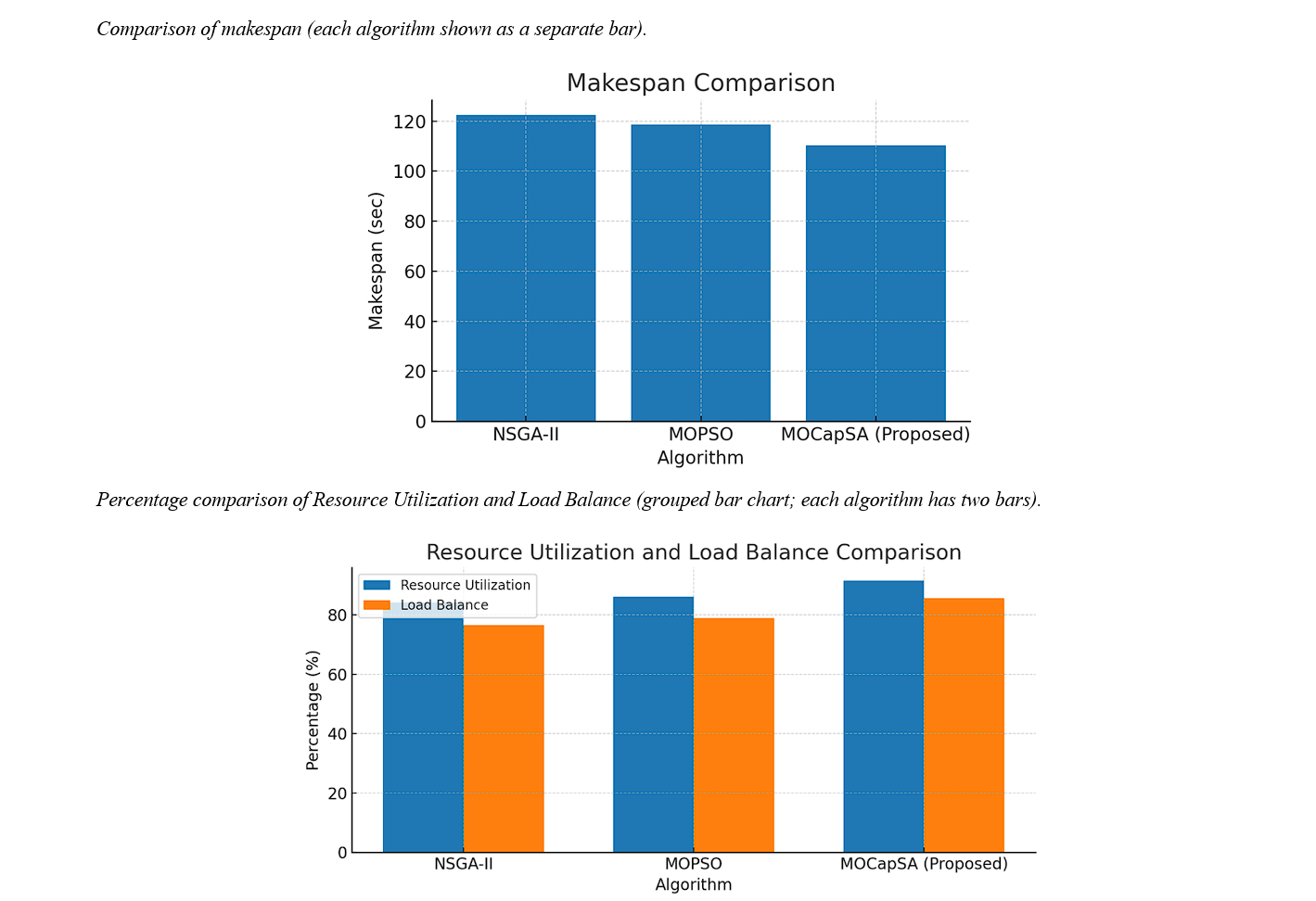Providing a Solution for Processing Heterogeneous Tasks in Cloud Computing Using Distributed Resource Allocation
Keywords:
Cloud Computing, heterogeneous task processing, distributed resource allocation, Multi-objective optimization, Load balancingAbstract
In this study, a novel approach is presented for processing heterogeneous tasks in Cloud Computing environments by leveraging optimal distributed resource allocation. The primary objective is to enhance processing efficiency and achieve effective resource utilization in conditions where tasks have diverse characteristics, varying data volumes, and different computational requirements. The proposed method models tasks and resources as a directed acyclic graph and employs a multi-objective optimization algorithm to perform resource allocation in a way that not only reduces the overall processing time but also ensures load balancing among resources. This approach, by incorporating priority queues and execution time analysis for each subtask, enables the selection of the most appropriate resource for each task. The simulation results indicate that the proposed method achieves significant improvements over conventional algorithms in reducing the overall job completion time, increasing resource utilization rates, and enhancing the quality of service in heterogeneous task processing.
References
Abrishami, S., Naghibzadeh, M., & Epema, D. H. (2013). Deadline-constrained workflow scheduling algorithms for Infrastructure as a Service Clouds. Future Generation Computer Systems, 29(1), 158-169. https://doi.org/10.1016/j.future.2012.05.004
Alqatan, S., Alshirah, M., Baker, M. B., Khafajeh, H., & Abuowaida, S. (2025). A Conceptual Framework for the Adoption of Cloud Computing in a Higher Education Institutions. Data & Metadata, 4, 431. https://doi.org/10.56294/dm2025431
Arabnejad, H., & Barbosa, J. G. (2014). List scheduling algorithm for heterogeneous systems by an optimistic cost table. IEEE Transactions on Parallel and Distributed Systems, 25(3), 682-694. https://doi.org/10.1109/TPDS.2013.57
Azami, M., Nader Shahi, M., & Hosseini, S. N. (2024). Modeling the application of cloud computing in small entrepreneurial businesses focusing on handicrafts. Journal of Entrepreneurship Education, 3(2).
Deb, K., & Jain, H. (2014). An evolutionary many-objective optimization algorithm using reference-point-based nondominated sorting approach, part I: solving problems with box constraints. IEEE Transactions on Evolutionary Computation, 18(4), 577-601. https://doi.org/10.1109/TEVC.2013.2281535
Doe, J., & Smith, A. (2024). Static resource allocation strategies in cloud computing: limitations and performance benchmarks. Journal of Cloud Engineering, 7(2), 123-135.
Doldi, A., Mozesi, A., & Gurji, M. B. (2023). Designing a human resources improvement model based on cloud computing (case study: Tejarat Bank). Science and Techniques of Information Management. https://doi.org/10.22091/stim.2023.9683.1980
Fard, H. M., Prodan, R., & Fahringer, T. (2012). Multi-objective list scheduling of workflow applications in heterogeneous systems 2012 12th IEEE/ACM International Symposium on Cluster, Cloud and Grid Computing,
Hao, Y., Qiu, Z., Xu, Q., He, Q., Fang, X., & Wang, C. (2023). Innovation strategy design of public sports service governance based on cloud computing. Journal of Cloud Computing, 12(1), 69.
IBM Quantum Experience. (2023). Cloud-Based Quantum Computing. https://quantum-computing.ibm.com/
Kaur, A., & Chana, I. (2014). Energy aware scheduling of deadline-constrained tasks in cloud computing. Cluster Computing, 17, 1265-1275. https://link.springer.com/article/10.1007/s10586-016-0566-9
Khasawneh, D. N. A. S., Khasawneh, A. J., Khasawneh, D. M. A. S., & Khasawneh, D. Y. J. a. (2023). Improving Arabic Content Delivery on Cloud Computing Platforms for Jordanian E-learning Environments. Migration Letters, 21(S1), 575-585. https://doi.org/10.59670/ml.v21iS1.6181
Khorsand, R., & Sharifi, M. (2014). A hybrid heuristic algorithm for scheduling workflow applications in heterogeneous computing systems. Journal of Parallel and Distributed Computing, 74(9), 2969-2982.
Kim, H., & Lee, S. (2024). Reinforcement learning-based resource allocation in hybrid cloud environments. IEEE Transactions on Cloud Computing.
Kmaleh, A. I. M. (2023). The Impact of Using the Cloud Computing Upon the Quality of Accounting Information and it's Reflection Upon the Development of the World Standards of Financial Reports in Jordanian Corporations. International Journal of Professional Business Review, 8(9), 23. https://doi.org/10.26668/businessreview/2023.v8i9.3771
Lăzăroiu, G. (2023). Artificial Intelligence Algorithms and Cloud Computing Technologies in Blockchain-Based Fintech Management. Oeconomia Copernicana, 14(3), 707-730. https://doi.org/10.24136/oc.2023.021
Li, K., Xu, G., Zhao, G., Dong, Y., & Wang, D. (2011). Cloud task scheduling based on load balancing ant colony optimization 2011 Sixth Annual ChinaGrid Conference,
Mell, P., & Grance, T. (2011). The NIST definition of cloud computing (NIST Special Publication, Issue.
Panda, S. K., Jana, P. K., & Ghosh, S. (2016). Workflow scheduling in cloud computing environment using a hybrid meta-heuristic algorithm 2016 International Conference on Computational Techniques in Information and Communication Technologies (ICCTICT),
Pham, Q. V., & Huh, E. N. (2016). Towards task scheduling in a cloud-fog computing system 2016 18th Asia-Pacific Network Operations and Management Symposium (APNOMS),
Sharma, R. K. (2023). Thematic Analysis of Big Data in Financial Institutions Using NLP Techniques With a Cloud Computing Perspective: A Systematic Literature Review. Information, 14(10), 577. https://doi.org/10.3390/info14100577
Singh, K. D. (2024). Fog Cloud Computing and IoT Integration for AI Enabled Autonomous Systems in Robotics. Eai Endorsed Transactions on Ai and Robotics, 3. https://doi.org/10.4108/airo.3617
Tsai, C. W., & Rodrigues, J. J. (2014). Metaheuristic scheduling for cloud: A survey. IEEE Systems Journal, 8(1), 279-291. https://doi.org/10.1109/JSYST.2013.2256731
Wang, H., & Rahman, M. (2025). Intelligent resource allocation optimization for cloud computing via machine learning.

Downloads
Published
Submitted
Revised
Accepted
Issue
Section
License
Copyright (c) 2025 Mohammad Hadi Dadizadeh Dargiri

This work is licensed under a Creative Commons Attribution-NonCommercial 4.0 International License.









